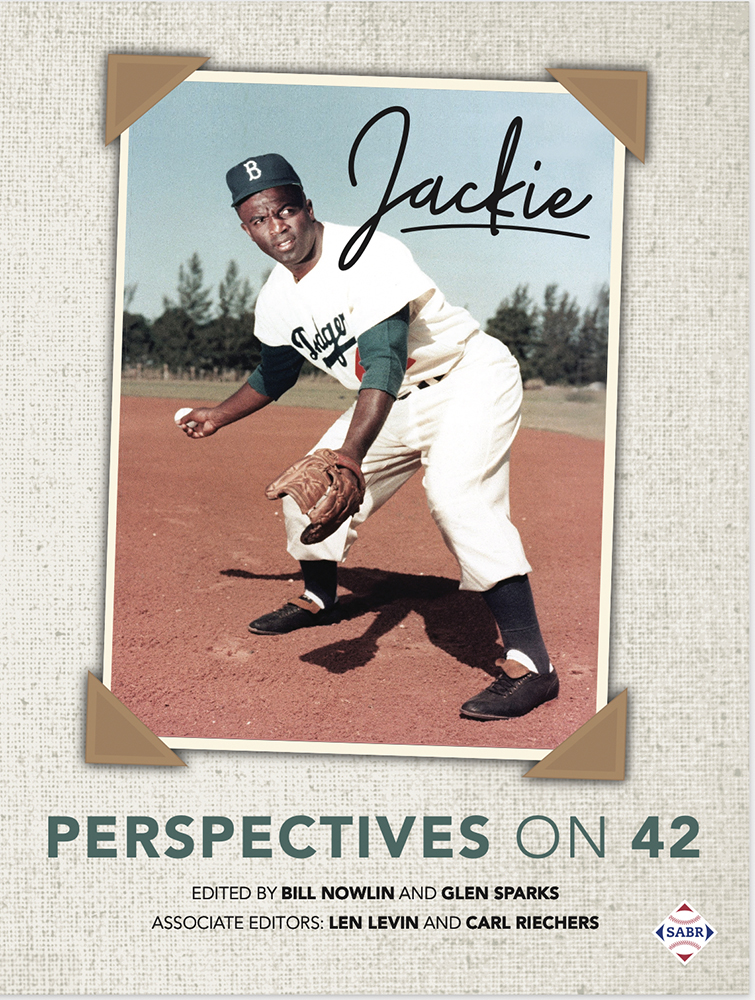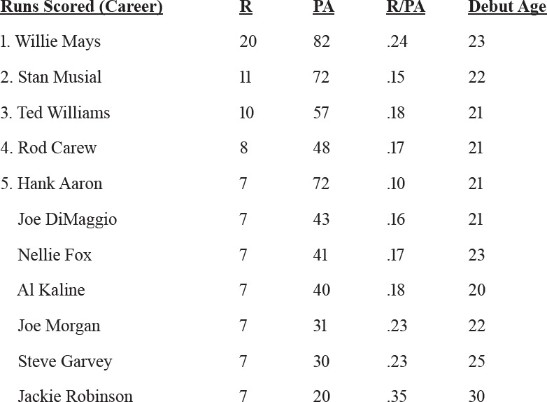Jackie Robinson in the MLB All-Star Game
This article was written by Mark S. Sternman
This article was published in Jackie Robinson: Perspectives on 42 (2021)
 A star among stars, Jackie Robinson had an excellent batting record in six career All-Star appearances. The influx of Robinson and other African-American stalwarts for the National League helped reverse the course of the series. Prior to integration, the American League won nine of the first 13 contests. Surprisingly, Robinson played in neither the 1947 nor 1948 midsummer classics although he finished in the top 15 of the MVP voting both years. The AL took both games to up its mark to 11-4. Robinson’s teams won four of the six games in which he played as the quicker-to-integrate National League dominated the All-Star Game from 1950 to 1987.
A star among stars, Jackie Robinson had an excellent batting record in six career All-Star appearances. The influx of Robinson and other African-American stalwarts for the National League helped reverse the course of the series. Prior to integration, the American League won nine of the first 13 contests. Surprisingly, Robinson played in neither the 1947 nor 1948 midsummer classics although he finished in the top 15 of the MVP voting both years. The AL took both games to up its mark to 11-4. Robinson’s teams won four of the six games in which he played as the quicker-to-integrate National League dominated the All-Star Game from 1950 to 1987.
The top vote-getter among National Leaguers,1 Robinson immediately made an impact on the 1949 game, the first to feature African-Americans, which started off poorly for the senior circuit when the American League plated four runs against Warren Spahn. Robinson helped get the NL back in the game. Starting at second and batting second, he doubled off Mel Parnell in his first plate appearance and scored on Stan Musial’s homer. In the third, Robinson helped tie the score at 4-4 when he walked. Musial “and Robinson put on a beautiful hit-and-run play, Musial’s ground ball going through the vacant shortstop spot for a single, and Robinson scorching the base paths as he fairly flew into third.”2 He scored as Ralph Kiner hit into a double play. Robinson reached on a fielder’s choice in the sixth and tallied his third run of the day on a two-run homer by Kiner that cut the AL lead to 8-7. The National League got no closer and lost 11-7. Robinson’s three runs scored tied the NL standard that Frankie Frisch set in 1934 and still remains through 2019. (Besides Robinson, the other African-American players in the 1949 game included fellow Dodgers Roy Campanella and Don Newcombe, plus Larry Doby of the Cleveland Indians.)
Robinson hit cleanup for the NL in 1950 and scored the game’s first run in the top of the second. After he singled, Enos Slaughter smacked an RBI triple. Robinson played the first 10 innings of the extra-inning affair before Brooklyn manager Burt Shotton pinch-hit for him with Johnny Wyrostek. After the game, Shotton said, “I didn’t want [Robinson] to hit into a double play, and Wyrostek, who hits .320, was a better bet, that’s all. … Jackie is slowed up by a leg injury.”3 Red Schoendienst’s homer in the 14th inning gave the NL a 4-3 win.
Again placed in the cleanup slot in 1951, Robinson played a key role in the game’s latter stages to ensure that the NL would win consecutive games for the first time in the history of the series. With the NL up 4-3 in the sixth, Robinson walked and scored on Gil Hodges’ homer. With runners on the corners, including the speedy Richie Ashburn on third and the NL now up 6-3 in the seventh, Robinson had a two-out bunt single that drove in an insurance run. Robinson had another infield hit in the ninth as the NL romped, 8-3. Commenting after the game, “Robinson said he was completely surprised by the type of pitching dished out by the AL’s five pitchers. ‘They told me this American League was a fast ball league,’ he shouted above the dressing room din. ‘I never saw so many curves, screwballs, and changes of pace in my life.’”4
In 1952 Robinson moved back up to second in the batting order. Robinson “crashed [Vic] Raschi’s first pitch into the second deck of the left field stands, about three rows deep.”5 Robinson’s only All-Star homer gave the NL a 1-0 lead. The NL would eventually triumph 3-2 in a game called on account of rain after five innings.
Robinson made the 1953 team as a reserve and pinch-hit in the game. His seventh-inning popup proved inconsequential in the 5-1 NL win.
Robinson reprised his outfield role but started and batted seventh in his 1954 All-Star finale. As with the first game he played in the series, Robinson’s NL team trailed 4-0, this time through three innings. By the time Robinson batted in the fourth, the NL had cut the lead to 4-2. Facing Sandy Consuegra with Ted Kluszewski on second and Ray Jablonski on first, Robinson, “though playing on creaky knees,”6 “walloped a double to center”7 to score both and tie the game. Don Mueller‘s pinch-hit double scored Robinson with the go-ahead run. (Willie Mays replaced Robinson in the outfield the next inning) in a game the AL would win, 11-9.
Mays and Robinson also both appear on the list of most runs scored as All-Stars:
Robinson has the highest percentage of runs scored per plate appearance of those who scored the most All-Star Game runs. He doubtless would have placed even higher on the career list had baseball apartheid not forced him to wait until the age of 30 to play in an All-Star Game.
Jackie Robinson’s performance as an All-Star represents a microcosm of his career. Although through no fault of his own he got off to a late start, Robinson excelled individually and led his teams to more victories than defeats once he finally had a chance to confront competitors of all colors.
MARK S. STERNMAN had the good fortune to attend the 1999 All-Star Game at Fenway Park and to profile Jackie Robinson’s predecessor Bonnie Serrell for a forthcoming SABR book on the 1942 Kansas City Monarchs. A fan of the New York Yankees who grew up in New York before settling in Boston, Sternman dedicates this article to his father, who stayed in the Empire State and as a child rooted for Robinson and his Brooklyn Dodgers.
Notes
1 “Williams, Jackie Top Record Vote of Fans,” The Sporting News, July 13, 1949: 2.
2 Roger Birtwell, “Brissie Great in Relief Role,” Boston Globe, July 12, 1949: 34.
3 “Schoendienst Homer First of Year as Righthander,” Boston Globe, July 12, 1950: 10. An alternative theory has Shotton selecting a left-handed batter to face the right-handed pitcher Allie Reynolds. Oscar Ruhl, “All-Star Glints,” The Sporting News, July 19, 1950: 34.
4 “National Leaguers Praise Garver; ‘He’s Great,’ Say Musial, Robinson,” Boston Globe, July 11, 1951: 8.
5 Gene Mack Jr., “Robinson, Sauer Homers Give N.L. Third Straight, 3-2,” Boston Globe, July 9, 1952: 16.
6 Frederick G. Lieb. “A.L. Stars Hurdle 13th – Win Hump on Hitting,” The Sporting News, July 21, 1954: 8.
7 Rud Rennie, “Rosen Hits 2 Homers, Bats In 5 Runs,” Boston Globe, July 14, 1954: 8.



